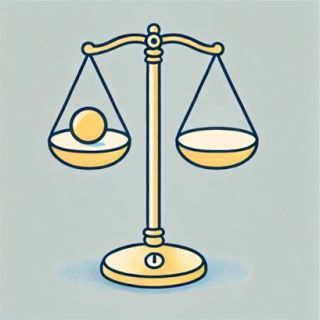Politics
What Happened to Nuance in Political Debates?
One-sided political opinions can be more popular than more balanced views..
Posted June 27, 2024 Reviewed by Hara Estroff Marano
Key points
- Ambivalent political opinions are unpopular with those on the same side of the issue.
- Meanwhile, people on the opposite side are often relatively indifferent.
- The two responses act as a disincentivie to expressing nuanced political views.

By Joseph J. Siev, Aviva Philipp-Muller, Geoffrey Durso, and Duane T. Wegener
Surveys show that tens of millions of Americans have nuanced opinions on political issues. Yet, political discourse remains more polarized than ever. How can this be?
Part of the explanation is news coverage and social media algorithms that promote extreme content, making it seem like more people hold extreme views than actually do.
But media biases are not entirely to blame. In new research published in the Journal of Experimental Social Psychology, we explored another possible reason nuanced opinions are underrepresented in political debates: Nuance is disincentivized because it can ultimately reduce a person’s popularity.
Our research focused on perceptions of people who express ambivalent political opinions, acknowledging good points on both sides of the issue, while still taking an overall position.
We thought ambivalent people might pay a price in terms of popularity. In other words, when people express ambivalent opinions, others might like and respect them less than they like those with one-sided opinions.
This could help explain the “death of nuance” in political discourse. It might also help revive it.
Endorsing Both Sides, Pleasing Neither
Participants began our studies by filling out a survey about COVID-19 mask mandates, immigration to the U.S., or capital punishment. The survey measured agreement with different reasons to take one side versus the other. This told us which side participants were on—for example, supporting versus opposing mask mandates—and whether they held their views with more or less ambivalence.
We then showed them another person’s responses to the same survey. Crucially, we randomly determined what that person’s responses were. Each participant rated one of four types of people:
- Type #1: Took the same side as participants and were not ambivalent; all their responses agreed with the participant’s overall position.
- Type #2: Took the same side as participants overall but were ambivalent; they agreed somewhat with the opposing side’s arguments, despite coming to the same conclusion participants did.
- Type #3: Took the opposing side from participants, without expressing any ambivalence.
- Type #4: Took the opposing side and were ambivalent, agreeing somewhat with arguments on participants’ side despite coming to the opposite conclusion.
We then assessed how much participants liked the other person, how trustworthy and intelligent they seemed, and how interested they would be in meeting them.
We found that people rated the ambivalent (vs. not ambivalent) types less positively. Overall, expressing ambivalence had social costs—not benefits.
This is troubling because it suggests there is a social disincentive against expressing nuanced opinions on political issues.
Still, there are nuances to the story.
Not Polarized Enough
Not everyone liked ambivalent types less than non-ambivalent types. It was mainly political in-group members—people who agreed with the target’s overall position on the issue (#2).
This could be for a few reasons. For example, people might think ambivalent in-group members are not committed to the group’s position. Or, they might suspect ambivalent in-group members are trying to “play both sides” or are otherwise confused or ignorant.
We see these kinds of dynamics in the real world when progressives accuse journalists of “both-sides-ing” and when Trump-supporters accuse moderate Republicans of being “RINOs.”
Taking nuanced stances on political issues is not the easiest path to popularity.
If You're Wrong, You're Wrong
We thought there might be benefits to expressing ambivalence when it comes to political out-group members, though, because ambivalence creates some common ground between people on opposite sides of the issue. This could balance things out for ambivalent people. Even if ambivalence creates some tension with in-group members, expressing ambivalence might help people reach across the political aisle.
But in our research, there was little evidence to support this possibility. When the participants in our studies took positions on the opposite side of the issue, whether they were ambivalent did not affect how much people liked them.
So, there was not much benefit for out-group members to offset the costs for in-group members.
Conclusions
The unpopularity of ambivalent opinions is not a law of nature. Our participants were American, but people from different cultural backgrounds might view ambivalence differently. Ambivalence might also be more popular when it is quite common or expected, which might be true for certain political topics. And, how people express their ambivalence could matter, such as whether it makes them passive or drives them to be politically engaged.
Some research suggests that one case where expressing ambivalence can be positive is when attempting to persuade people who are opposed to one’s view but have strong attitudes (e.g., are highly certain of their position, strongly identified with it).
On the other hand, our findings likely apply to a range of situations—perhaps even beyond politics. Ambivalence about sports rivals like the Bears and Packers might not go over well with die-hard Bears and Packers fans. Similarly for consumers loyal to products like iOS and Android. So, the results also seem relevant to marketing and consumer behavior.
Ultimately, by understanding the social incentives for and against expressing ambivalent opinions, we can find ways to foster more nuanced and constructive political discourse.
References
Siev, Joseph J., Aviva Philipp-Muller, Geoffrey R. O. Durso, and Duane T. Wegener (2024), Endorsing both sides, pleasing neither: Ambivalent individuals face unexpected social costs in political conflicts. Journal of Experimental Social Psychology, 114, 104631. https://doi.org/10.1016/j.jesp.2024.104631




